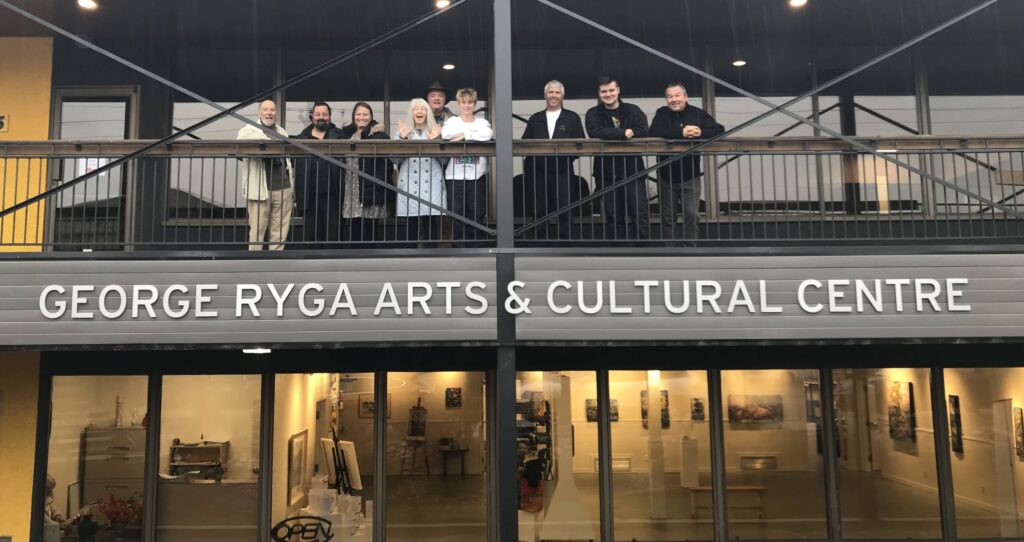What Shakespeare is to Stratford-upon-Avon, George Ryga is to Summerland.
Many Summerlanders are familiar with this name, whether it be from the George Ryga Arts & Cultural Centre in town or the annual Ryga Arts Festival.
What they may not know is that the Alberta-born, internationally renowned author and playwright lived in Summerland for half of his life and wrote many of his acclaimed works there.
Peter Hay and Dorthea Atwater retired to Summerland in 2007, after long careers in theatre, education, publishing and the high-tech industries, taking them from the Lower Mainland to Los Angeles. What drew them to Summerland were the memories of George Ryga and his family whom they knew from fifty years before.
Peter and Dorthea met at Simon Fraser University in 1967 and worked together in its vibrant theatre program. The first Canadian play that Peter saw soon after he arrived from England in Vancouver was George Ryga’s The Ecstasy of Rita Joe – A drama about a young indigenous woman, brutally murdered on Vancouver’s Skid Row.
Hay still remembers the rare long silence at the end of the performance, as the audience digested its powerful message, followed by an eruption of applause. It became the defining play of a new era in Canadian theatre.
That same summer, Peter started a new job as the literary manager of the Vancouver Playhouse and was introduced to its star playwright, George Ryga. Born in Hungary, where his father, Julius Hay, also a playwright, had been jailed following the failed revolution of 1956, Peter found an instant rapport with George Ryga, the son of Ukrainian immigrants, whose own radicalism was shaped by the Soviet repression of freedom in Eastern Europe.
George soon invited Peter to visit his home on Caldwell Street in Summerland, where he lived with his wife Norma and a growing family. The old house was a beehive of social activity, with neighbours, friends and complete strangers dropping in day and night with fresh produce, or a guitar and a new song , “The Ryga home was always resounding with lively conversation and laughter,” Peter recalls, “and you’d find George out in his orchard or in a corner, battering away amidst the noise on his manual typewriter.”
Peter describes George as soft-spoken, with a gentle smile, unlike his work which was passionate and hard-hitting. He wrote about people on the margins of society, giving voice to labourers, immigrants, visionaries, and struggling artists.
Peter joined Ryga’s fight to establish a distinctly Canadian culture, as a critic and by starting a play publishing program with Talonbooks in Vancouver. Talonplays made it possible for the output of dozens of prominent Canadian playwrights to be taught in universities and schools. The first of many works by George Ryga he published was The Ecstasy of Rita Joe, a bestseller after more than fifty years.
When Peter and Dorthea moved to California in 1980, they tried to buy a house in Los Angeles, but didn’t have the proper references to get a mortgage. Ryga co-signed the papers for their first house without a second thought, an act of kindness he had done for several of his friends in Summerland and elsewhere.
They kept in touch, despite the distance, until Ryga’s early death in 1987 at age 55.
By the time Peter and Dorthea returned to Canada, settling in Summerland twenty years after George’s passing, Norma and the rest of the family had moved away. The house on Caldwell Street had become “The Ryga Centre”, a retreat for writers and musicians, owned by a non-profit society made up of Ryga’s old friends. But increasingly the house needed repairs, so in 2014 the Centre closed and the Society sold the building. As Peter puts it “the spirit of George Ryga seemed to have departed Summerland.”
But since then, much work has been done to revive his legacy by the friends and family of George Ryga, and others inspired by his work. Today, if you walk around Summerland, you’ll find a plaque and display case at the newly built Library, a Ryga Family Archive at the Summerland Museum & Archives, and the recently renovated Arts Centre, now named in George Ryga’s honour.
George spear-headed a long battle to establish a Community Arts Centre in Summerland so there was surprise and delight in store for the fourteen members of the Ryga family who came back to attend the unveiling of the George Ryga Arts & Cultural Centre in October of 2021.
Peter and Dorthea also helped to found the annual Ryga Arts Festival in 2016. The multi-disciplinary event held in September is inspired by George Ryga’s spirit of creativity, ideals and activism.
To support the long-term goals of the Festival, Peter and Dorthea established the Ryga Festival Society Fund with the Community Foundation. This Fund is still growing and will benefit from another legacy fund which they set up with the Foundation that will continue to support all their favourite non-profits after they are gone. “It’s our ticket to immortality,” as they like to quip.


